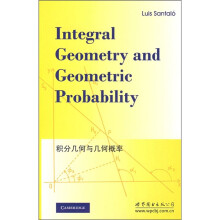Editors Statement
Foreword
Preface
Chapter 1. Convex Sets in the Plane
1. Introduction
2. Envelope of a Family of Lines
3. Mixed Areas of Minkowski
4. Some Special Convex Sets
5. Surface Area of the Unit Sphere and Volume of the Unit Ball
6. Notes and Exercises
Chapter 2. Sets of Points and Poisson Processes in the Plane
1. Density for Sets of Points
2. First Integral Formulas
3. Sets of Triples of Points
4. Homogeneous Planar Poisson Point Processes
5. Notes
Chapter 3. Sets of Lines in the Plane
1. Density for Sets of Lines
2. Lines That Intersect a Convex Set or a Curve
3. Lines That Cut or Separate Two Convex Sets
4. Geometric Applications
5. Notes and Exercises
Chapter 4. Pairs of Points and Pairs of Lines
1. Density for Pairs of Points
2. Integrals for the Power of the Chords of a Convex Set.
3. Density for Pairs of Lines
4. Division of the Plane by Random Lines
5. Notes
Chapter 5. Sets of Strips in the Plane
1. Density for Sets of Strips
2. Buffons Needle Problem
3. Sets of Points, Lines, and Strips
4. Some Mean Values
5. Notes
Chapter 6. The Group of Motions in the Plane: Kinematic Density .
1. The Group of Motions in the Plane
2. The Differential Forms on 9Jl
3. The Kinematic Density
4. Sets of Segments
5. Convex Sets That Intersect Another Convex Set
6. Some Integral Formulas
7. A Mean Value; Coverage Problems
8. Notes and Exercises
Chapter 7. Fundamental Formulas of Poinear~ and Blaschke
1. A New Expression for the Kinematic Density
2. Poincar6s Formula
3. Total Curvature of a Closed Curve and of a Plane Domain
4. Fundamental Formula of Blaschke
5. The lsoperimetric Inequality .
6. Hadwigers Conditions for a Domain to Be Able to Contain Another
7. Notes
Chapter 8. Lattices of Figures
1. Definitions and Fundamental Formula
2. Lattices of Domains
3. Lattices of Curves
4. Lattices Of Points
5. Notes and Exercise
Chapter 9. Differential Forms and Lie Groups
1. Differential Forms
2. Pfaffian Differential Systems
3. Mappings of Differentiable Manifolds
4. Lie Groups; Left and Right Translations
5. Left-lnvariant Differential Forms
6. Maurer-Cartan Equations
7. lnvariant Volume Elements of a Group: Unimodular Groups
8. Notes and Exercises
Chapter 10. Density and Measure in Homogeneous Spaces
1. Introduction
2. invariant Subgroups and Quotient Groups
3. Other Conditions for the Existence of a Density on Homo-geneous Spaces
4. Examples
5. Lie Transformation Groups
6. Notes and Exercises
Chapter 11. The Affine Groups
1. The Groups of Affine Transformations
2. Densities for Linear Spaces with Respect to Special Homo-geneous Affinities
3. Densities for Linear Subspaces with Respect to the SpecialNonhomogeneous Affine Group
4. Notes and Exercises
Chapter 12. The Group of Motions in E,
1. Introduction
2. Densities for Linear Spaces in E
3. A Differential Formula
4. Density for r-Planes about a Fixed q-Plane
5. Another Form of the Density for r-Planes in
6. Sets of Pairs of Linear Spaces
7. Notes
Chapter 13. Convex Sets in
1. Convex Sets and Quermassintegrale
2. Cauchys Formula
3. Parallel Convex Sets; Steiners Formula
4. Integral Formulas Relating to the Projections of a Convex Set on Linear Subspaces
5. Integrals of Mean Curvature
6. Integrals of Mean Curvature and Quermassintegrale.
7. Integrals of Mean Curvature of a Flattened Convex Body
8. Notes
Chapter 14. Linear Subspaces, Convex Sets, and Compact Manifolds
1. Sets of r-Planes That Intersect a Convex Set
2. Geometric Probabilities
3. Croftons Formulas in En
4. Some Relations between Densities of Linear Subspaces
5. Linear Subspaces That Intersect a Manifold
6. Hypersurfaces and Linear Spaces
7. Notes
Chapter 15. The Kinematic Density in E
1. Formulas on Densities
2. Integral of the Volume
3. A Differential Formula
4. The Kinematic Fundamental Formula
5. Fundamental Formula for Convex Sets
6. Mean Values for the Integrals of Mean Curvature
7. Fundamental Formula for Cylinders
8. Some Mean Values
9. Lattices in En.
10. Notes and Exercise
Chapter 16. Geometric and Statistical Applications; Stereology
1. Size Distribution of Particles Derived from the Size Distribution of Their Sections
2. Intersection with Random Planes
3. Intersection with Random Lines
4. Notes
Chapter 17. Noneuclidean Integral Geometry
1. The n-Dimensional Noneuclidean Space
2. The Gauss-Bonnet Formula for Noneuclidean Spaces
3. Kinematic Density and Density for r-Planes
4. Sets of r-Planes That Meet a Fixed Body
5. Notes
Chapter 18. Croftons Formulas and the Kinematic Fundamental Formula
in Noneuclidean Spaces
1. Croftons Formulas
2. Dual Formulas in Elliptic Space
3. The Kinematic Fundamental Formula in Noneuclidean
Spaces
4. Steiners Formula in Noneuclidean Spaces
5. An Integral Formula for Convex Bodies in Elliptic Space
6. Notes
Chapter 19. Integral Geometry and Foliated Spaces; Trends in Integral Geometry
1. Foliated Spaces
2. Sets of Geodesics in a Riemann Manifold
3. Measure of Two-Dimensional Sets of Geodesics
4. Measure of (2n - 2)-Dimensional Sets of Geodesics
5. Sets of Geodesic Segments
6. Integral Geometry on Complex Spaces
7. Symplectic Integral Geometry
8. The Integral Geometry of Gelfand
9. Notes
Appendix. Differential Forms and Exterior Calculus
1. Differential Forms and Exterior Product
2. Two Applications of the Exterior Product
3. Exterior Differentiation
4. Stokes Formula
5. Comparison with Vector Calculus in Euclidean Three-Dimensional Space
6. Differential Forms over Manifolds
Bibliography and References
Author Index
Subiect Index
Though its title "Integral Geometry" may appear somewhat unusual in thiscontext it is nevertheless quite appropriate, for Integral Geometry is anoutgrowth of what in the olden days was referred to as "geometric probabil-ities."
Originating, as legend has it, with the Buffon needle problem (which afternearly two centuries has lost little of its elegance and appeal), geometricprobabilities have run into difficulties culminating in the paradoxes ofBertrand which threatened the fledgling field with banishment from the homeof Mathematics. In rescuing it from this fate, Poincar6 made the suggestionthat the arbitrariness of definition underlying the paradoxes could be removedby tying closer the definition of probability with a geometric group of which itwould have to be an invariant.

 缺书网
缺书网 扫码进群
扫码进群






